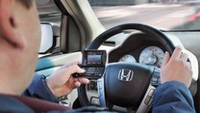Study says texting and dialing while driving causes crashes; talking while driving is okay

A new study based on real-life stats confirms that texting and dialing while driving increases the chance of an accident taking place, especially among young drivers. But the study also discovered that talking on the phone while driving does not raise the odds of a crash occurring. Those conducting the test did point out that while talking on the phone while behind the wheel won't take your eyes off the road, it can lead to other deadly behaviors like reaching for the phone and dialing it.
The study used some heavy duty technology including video cameras, GPS, lane trackers and sensors to measure speed and acceleration. These were placed in the cars belonging to 42 newly licensed drivers aged 16 and 17, and in the cars of 109 veteran drivers with an average of 20 years behind the wheel. The newly licensed and teen drivers are banned from using a cellphone while driving in 37 states. 12 states ban the use of handsets behind the wheel for all drivers, while 41 do not allow texting while driving.
The findings that talking while driving will not increase the chances of an accident is not widely accepted. David Strayer, a scientist who has done research on this subject at the University of Utah, says that this finding goes against his work on the subject. Strayer blames the instruments used to measure the level of distractions, saying that video cameras cannot show "cognitive distraction".
source: AP
The data shows that if the young drivers reach for a cellphone or start dialing, the risk of a crash is increased by a whopping 700%. If these youngsters were sending or receiving a text, the risk of an accident rose by 400%. The test for older drivers shows that only dialing while driving increased the odds of a smash-up. The study started before texting became widespread, so it is unknown how older drivers wold respond to texting while driving.
The findings that talking while driving will not increase the chances of an accident is not widely accepted. David Strayer, a scientist who has done research on this subject at the University of Utah, says that this finding goes against his work on the subject. Strayer blames the instruments used to measure the level of distractions, saying that video cameras cannot show "cognitive distraction".
source: AP













Things that are NOT allowed: